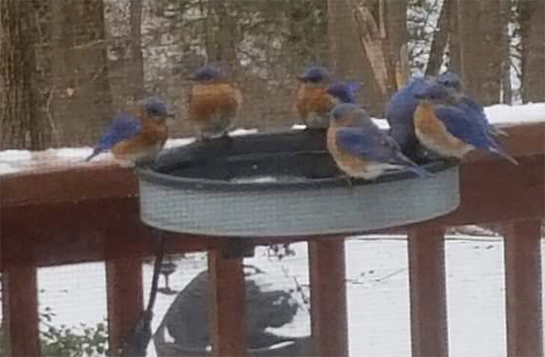During Winter, the three basic elements of a backyard habitat can make all the difference to a wild bird. Here’s a trio of key tips, with a focus on making winter bird houses available for roosting songbirds.
Shelter
Put Up a Bird House — It’s never too early
In previous seasonal checklists, we’ve emphasized the importance of providing Food and Water all year round. But is a bird house only Shelter during nesting season?
The protective shelter provided by a bird house in winter can be a life-saver for a songbird seeking a safe place to roost or sleep—especially during extreme winter weather.
If you’ve been waiting until Spring to put up your bird house, don’t wait any longer—put it up now. From some songbirds’ point-of-view, your backyard bird house is desirable real estate all year round.
Bird houses in winter—A songbird’s safe place to keep warm and roost
In Spring and Summer, of course, it’s mostly about security and privacy for nesting. But during Fall and Winter, bird houses can also be a life-saving refuge when protective foliage is sparse; providing safe places for cavity nesters to warm up, roost and sleep.
For Eastern Bluebirds, Black-capped Chickadees, Titmice, and Carolina Wrens, among others, a bird house can be a welcome respite from extreme weather and sanctuary from predators at night.
‘Advertise a Vacancy’ to early nesters, like Bluebirds
Even if your backyard birds don’t seem to be making use of your winter bird house, they are making note of its location. For example, the Eastern Bluebirds you may be seeing flock to your bird bath right now (See the following photo of Eastern Bluebirds from customer Tom Street), nest earlier than most other species. They’ll begin pairing up and scouting for nesting sites in a few weeks, so having your Bluebird box ready now can only be ‘good advertising’!
Learn more about bird houses
We have advice on how to choose a bird house, where to best place it in your yard and how to maintain it year round. See our Resource pages ‘Guide to Bird Houses and Recommended Resources‘.

Water
Heat things up! Keep bird baths from freezing over.
We can never, ever, say it enough: Water is critical year round for wild birds to drink and bathe. During freezing temperatures, your heated bird bath might just be the only accessible, unfrozen source of water nearby for your backyard birds.
How to keep water in your bird bath from freezing
An ice-free bird bath can be a very popular bird bath. And it’s easier for you, too! You won’t be out there constantly chipping away at ice! As a bonus, it will be a highlight of winter backyard birding for you and your family. If you want to find out more about heated baths or how to keep water from freezing in yours, see ‘Heated Bird Baths & De-icers‘.
Food
Maximize nutrition in your feeders.
Keeping warm takes extra calories! With fast-acting metabolisms, even when it’s not freezing cold, birds must be efficient eaters—maximize each and every opportunity for nourishment. Feed them high-calorie, fresh seeds and suet to supply the essential protein, fat and carbohydrates they require.
Never feed bread to wild birds.
Please NEVER feed bread, crackers, popcorn or other human snack food items to birds. They have zero nutrition, but give birds the artificial feeling that they are full. Wild birds, in particular, Chickadees, can freeze to death overnight with seemingly full stomachs. This includes all wild birds, even ducks and geese who can develop a debilitating condition called “angel wing syndrome” from the lack of nutrition.
Bird feeders in our backyard habitats are even more critical this time of year as Nature’s seasonal food supply dwindles and Spring is still miles away.
More info about wild birds—what to feed them and how
For more about wild birds’ food requirements and how to provide maximum nutrition with your backyard feeder, please see “Quality Food and Clean Feeders Matter“.






